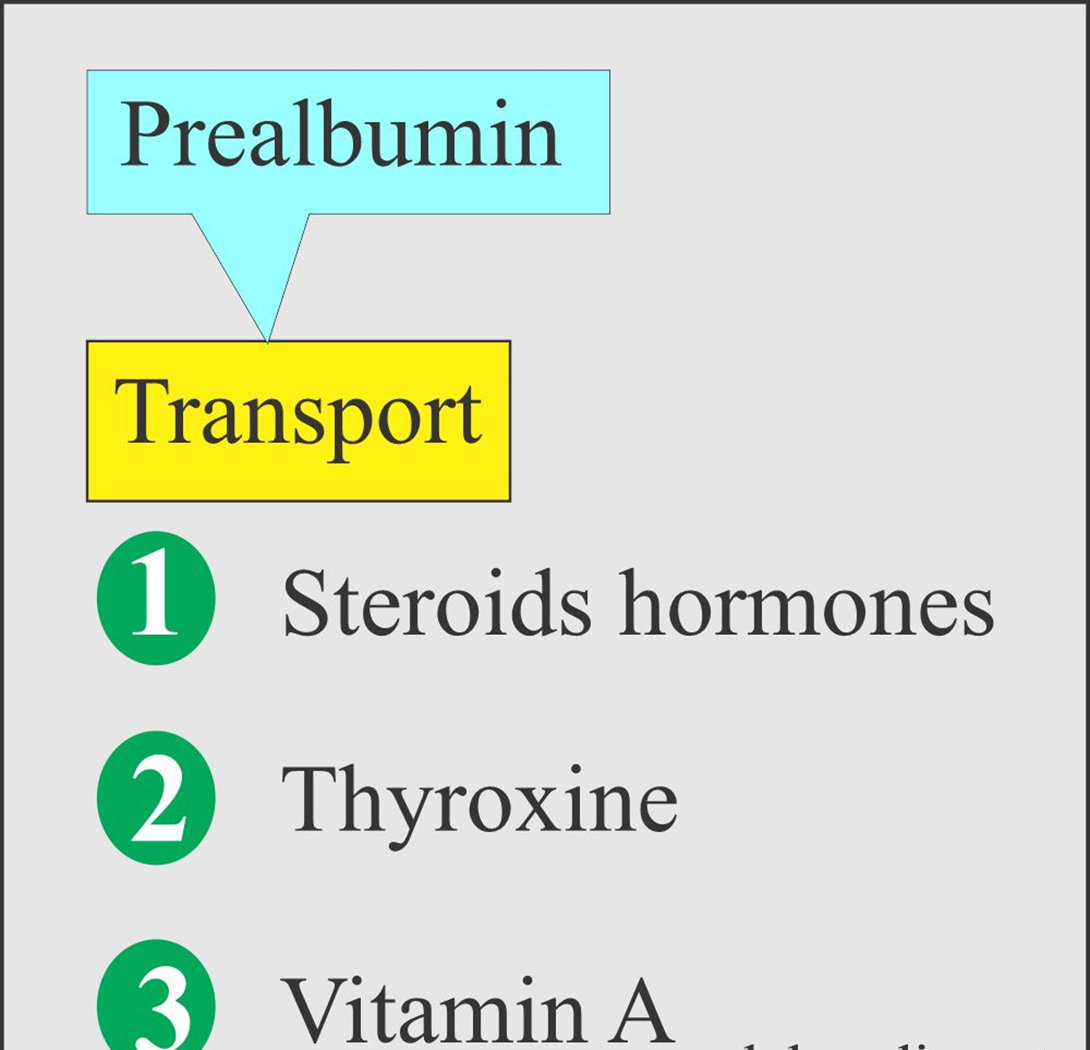A nurse is caring for a client who has a major burn injury and is receiving total parenteral nutrition. Which of the following laboratory tests is the priority for the nurse to use to confirm the client is receiving adequate nutrition?
Prealbumin
Folic acid
Magnesium
Transferrin
The Correct Answer is A
Choice A reason: Prealbumin is a protein that is synthesized by the liver and reflects the current nutritional status of the client. It has a short half-life of 2 to 3 days, which makes it a sensitive indicator of changes in protein intake. Prealbumin levels are decreased in clients who are malnourished or have inflammation, infection, or liver disease. The nurse should monitor the prealbumin levels of the client who is receiving total parenteral nutrition to ensure that they are within the normal range of 15 to 36 mg/dL.
Choice B reason: Folic acid is a water-soluble vitamin that is involved in DNA synthesis, cell division, and red blood cell production. Folic acid levels are decreased in clients who have malabsorption, alcoholism, or certain medications, such as methotrexate or phenytoin. The nurse should assess the folic acid levels of the client who is receiving total parenteral nutrition, but it is not the priority test to confirm adequate nutrition.
Choice C reason: Magnesium is a mineral that is involved in many enzymatic reactions, muscle contraction, nerve transmission, and bone formation. Magnesium levels are decreased in clients who have malnutrition, diarrhea, vomiting, or diuretic use. The nurse should evaluate the magnesium levels of the client who is receiving total parenteral nutrition, but it is not the priority test to confirm adequate nutrition.
Choice D reason: Transferrin is a protein that transports iron in the blood and reflects the iron stores of the client. Transferrin levels are decreased in clients who have iron deficiency anemia, chronic disease, or liver disease. The nurse should check the transferrin levels of the client who is receiving total parenteral nutrition, but it is not the priority test to confirm adequate nutrition.

Nursing Test Bank
Naxlex Comprehensive Predictor Exams
Related Questions
Correct Answer is B
Explanation
Choice A reason: Flossing dentures is not necessary, as dentures do not have spaces between the teeth where plaque and food particles can accumulate. Flossing dentures may damage the denture material or cause it to loosen.
Choice B reason: Dentures should be cleaned with a soft material to prevent scratches or damage. A washcloth is gentle enough to clean the denture surfaces without causing harm.
Choice C reason: Wiping dentures before storing them in a dry container at night is not advisable, as it may cause the dentures to crack or warp. Dentures should be soaked in water or a denture cleanser solution overnight to keep them moist and prevent them from losing their shape.
Choice D reason: Wrapping gloved fingers with gauze to remove dentures is not a standard practice. Dentures should be removed carefully by rocking them slightly to break the seal with the gums. Using gauze is unnecessary and may not be as effective or safe for the dentures or the oral tissues.
Correct Answer is D
Explanation
Choice A reason: Increased cholesterol is not an indication that the weight loss program has been effective, as it is a risk factor for cardiovascular disease and stroke. The nurse should expect the client's cholesterol level to decrease as a result of the weight loss program, as it can lower the production and absorption of cholesterol in the body.
Choice B reason: Increased glycosylated hemoglobin (HbA1c) is not an indication that the weight loss program has been effective, as it is a measure of the average blood glucose level over the past 2 to 3 months. The nurse should expect the client's HbA1c level to decrease as a result of the weight loss program, as it can improve the insulin sensitivity and glucose metabolism of the body.
Choice C reason: Increased LDL (low-density lipoprotein) is not an indication that the weight loss program has been effective, as it is the "bad" cholesterol that can accumulate in the arteries and cause atherosclerosis. The nurse should expect the client's LDL level to decrease as a result of the weight loss program, as it can reduce the synthesis and secretion of LDL in the liver.
Choice D reason: Increased HDL (high-density lipoprotein) is an indication that the weight loss program has been effective, as it is the "good" cholesterol that can remove excess cholesterol from the blood and transport it to the liver for excretion. The nurse should expect the client's HDL level to increase as a result of the weight loss program, as it can enhance the activity and expression of HDL in the body.
Whether you are a student looking to ace your exams or a practicing nurse seeking to enhance your expertise , our nursing education contents will empower you with the confidence and competence to make a difference in the lives of patients and become a respected leader in the healthcare field.
Visit Naxlex, invest in your future and unlock endless possibilities with our unparalleled nursing education contents today
Report Wrong Answer on the Current Question
Do you disagree with the answer? If yes, what is your expected answer? Explain.
Kindly be descriptive with the issue you are facing.
